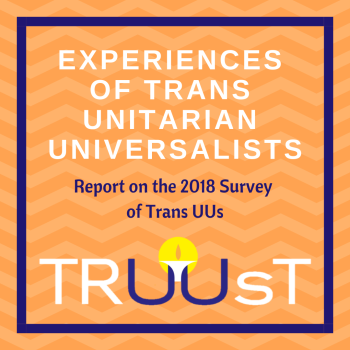 Today, TRUUsT has released a report that provides an unprecedented look at the the experiences of trans Unitarian Universalists, based on a survey of hundreds of trans UUs conducted in spring 2018 by TRUUsT and the Unitarian Universalist Association’s Multicultural Ministries office.
Today, TRUUsT has released a report that provides an unprecedented look at the the experiences of trans Unitarian Universalists, based on a survey of hundreds of trans UUs conducted in spring 2018 by TRUUsT and the Unitarian Universalist Association’s Multicultural Ministries office.
The report provides a portrait of who trans UUs are, shares trends in their experiences of inclusion and marginalization in UU congregations, gives a snapshot of the particular experiences of trans religious professionals, and offers actions that all Unitarian Universalists can take to improve the experiences of trans people within Unitarian Universalism.
On the thirtieth anniversary of the Welcoming Congregation Program, launched in 1989 to support Unitarian Universalist congregations in becoming more welcoming of lesbian, gay, and bisexual people and revised ten years later to include transgender people, it is tempting to declare success. After all, 75 percent of UU congregations have gone through the program and Unitarian Universalism has made great strides toward fully embodying its values and commitment to being an LGBTQ-welcoming faith. But TRUUsT’s report shows that not all LGBTQ people experience full welcome in UU congregations.
The report shares that only 28 percent of trans UUs feel that their congregation is completely inclusive of them as trans people, 42 percent of trans UUs regularly experience trans-related marginalization in UU spaces, and less than half of trans UUs feel spiritually nourished and connected at their congregation.
Survey results show that the majority of trans UUs are marginalized in multiple ways, and the demographics of trans UUs are very different than the demographics of Unitarian Universalism as a whole. Trans UUs are more likely to be low-income, young, disabled, racially diverse, and LGBQ than the general UU population, and the more marginalized identities they hold, the less likely trans UUs are to experience full inclusion. For example, only 15 percent of trans UUs of color feel as though their congregation is completely inclusive of them as trans people, and only 10 percent of Black trans UUs feel that way.
Survey results also show that the reasons trans UUs leave congregations aren’t limited to trans-related struggles; trans UUs also leave due to other identity-related oppression such as racism, classism, ableism, and ageism, as well as experiences of hypocrisy, unfulfilling worship and spiritual experiences, and abuse or bullying.
These results make it plain that creating trans-affirming UU spaces requires grappling with the intersections of gender, sexuality, race, class, disability, and age. Single-issue approaches to welcome do not serve trans people, and inclusion can’t stop at basic access (such as using inclusive language and having all-gender bathrooms available).
In today’s political climate, trans people need spiritual spaces more than ever, and Unitarian Universalism needs the unique spiritual gifts and perspectives of trans people. Yet TRUUsT’s report shows that despite decades of stated dedication to being an LGBTQ-welcoming faith and a force for justice for LGBTQ people, UU congregations are not currently safe, affirming, and spiritually fulfilling for the majority of trans people. However, the report also points a way forward, sharing five actions that all Unitarian Universalists can take to support trans UUs and live into the values of this faith.
Check out the executive summary or read the full report now.


